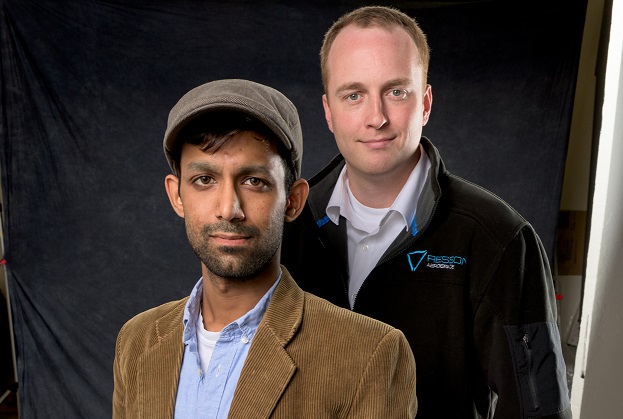Travis McDonough loves being able to leave his office, jump on his bike and pedal five minutes to Stanford University.
The founder and CEO of Halifax-based Kinduct Technologies moved to the San Francisco area last summer and is now staffing the medical-tech company’s office in Palo Alto. He emphasizes that his company is still based in Halifax, where he hopes to employ 100 people by sometime in 2017. But the advantages of having an office in Silicon Valley are huge.
“It feels great to know we’re five minutes away from some of the best thought-leaders in the world,” said McDonough.
Kinduct is not alone. As the Atlantic Canadian startup community matures, more and more of the region’s innovation companies are opening offices or forming partnerships in Silicon Valley. Such arrangements offer more than just prime office space close to customers — they often also enhance research and development and improve the companies’ best practices.
It’s ambitious to open a base about 6,000 kilometres away from head office, and where the property costs are atrocious. But there is simply no substitute for the access, the networking and the partnerships that can be found in Silicon Valley.
Kinduct and Fredericton-based Resson have opened Silicon Valley offices as they attracted funding from California investors. Resson’s US$11-million investment included a contribution from returning investor Rho Canada Ventures. Rho principal Jeff Grammer became the executive chairman of the company and now heads its new office in San Jose, Calif. Co-Founders Rishin Behl and Peter Goggin continue to operate the company headquarters in Fredericton.
Halifax's STI Exits for a Reported $200M
Meanwhile, Metamaterial Technologies Inc., the Halifax developer of special materials that alter light, announced in May 2016 it had bought the business of Silicon Valley peer Rolith, giving it a research and development base in Silicon Valley.
MTI set up an office in Rolith’s home town of Pleasanton, Calif., and brought on board the target company’s state-of-the-art R&D facilities and key employees. Some equipment was to be transferred to Nova Scotia, where the manufacturing operations will be based. CEO George Palikaras said the acquisition helped MTI reach the point at which it and Airbus are launching their first product, MetaAIR.
“The acquisition from last year has been very successful because in any project there are always little problems that crop up,” said Palikaras. “The acquisition allowed us to upgrade the nanofabrication process. There has also been a new patent resulted from that deal.”
Another Halifax company, SkySquirrel, has a long-standing partnership with VineView, based in St. Helena, Calif., 100 kilometres north of San Francisco. SkySquirrel uses drones to collect data on vineyards, and the benefits of teaming up with a complementary company in the Napa Valley wine region are obvious.
“VineView has been a leading provider of remote sensing services to grape growers in Napa Valley for 15 years and are recognized as experts in aerial vineyard crop diagnostics,” said SkySquirrel CEO Richard van der Put. “They bring extensive knowledge of grapevine disease detection and have developed a successful regional business model in California. Together we are able to provide a platform to scale this technology globally.”
And finally, 4Deep Inwater Imaging of Halifax gained entry to an R&D facility in Silicon Valley when it struck a partnership in 2015 with China’s Guangzhou Bosma.










